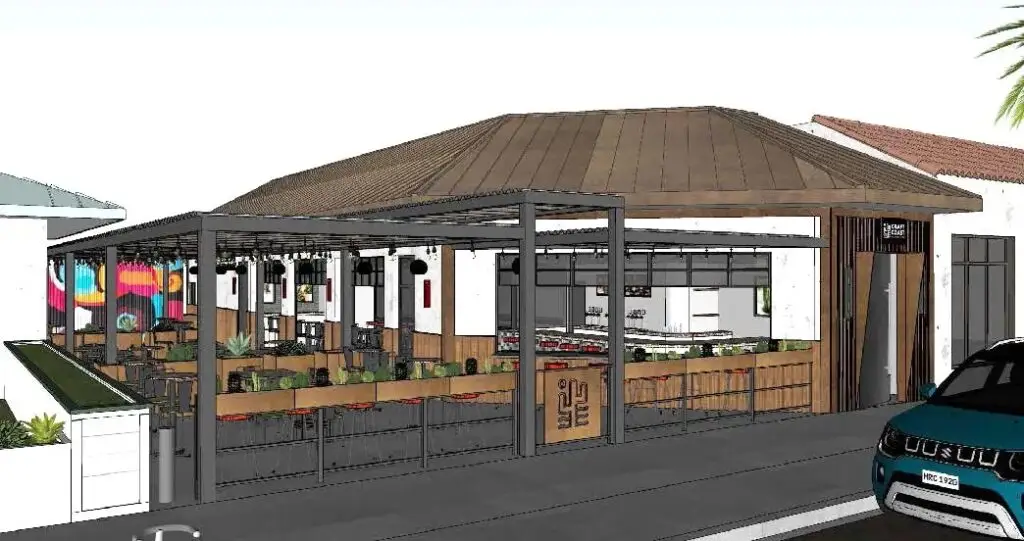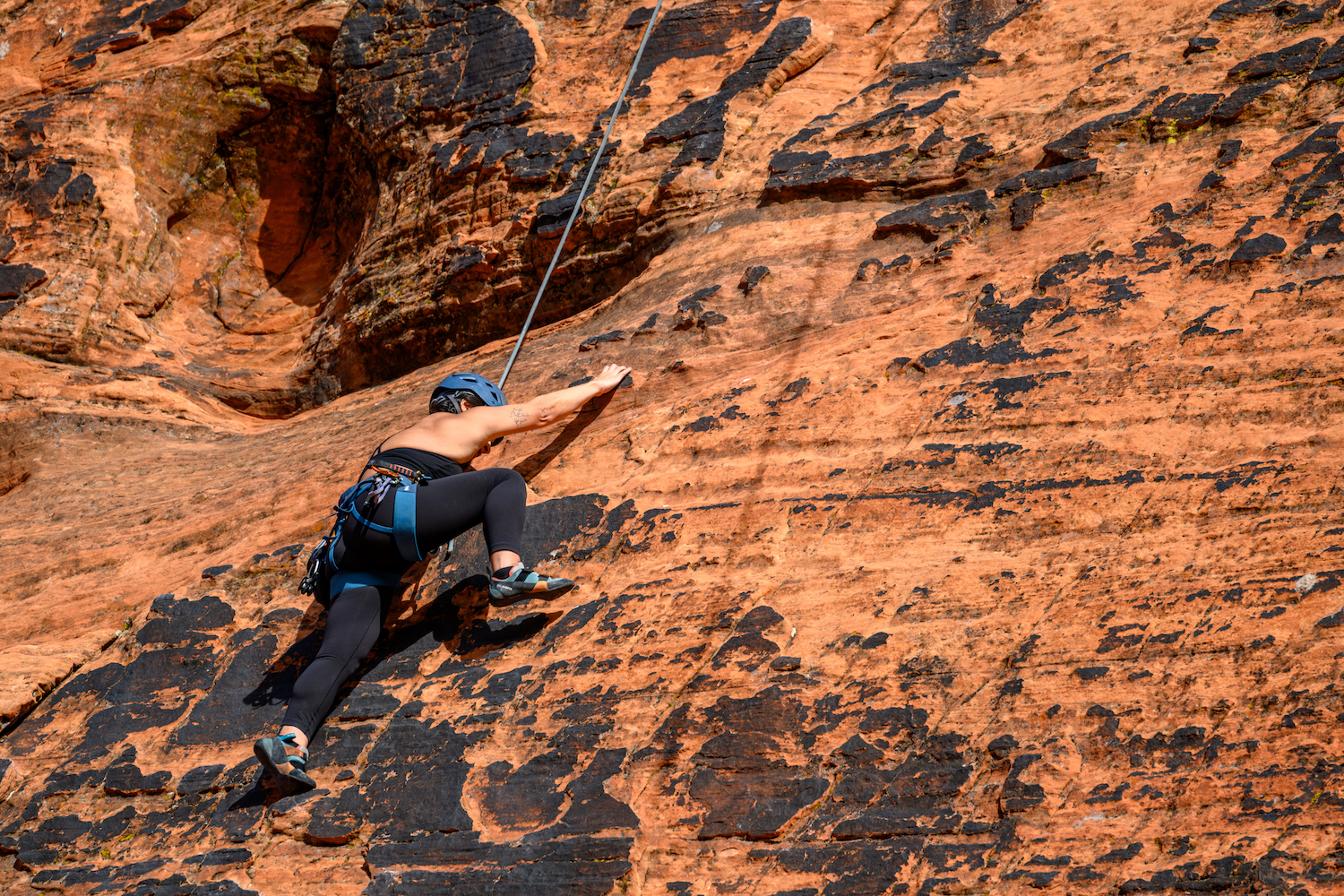The silence up here is loud. The wind is taunting me, calling my bluff. All around me, the red sandstone seems unimpressed by my presence.
Eighty feet off the ground, I reach left. My palm slides down the gritty rock wall, looking for something, anything, to hold on to. But it’s unforgiving. To my right, the flat surfaces give way to small, crimpy holds as I balance on a ledge that barely passes as a foothold. It’s my fourth climb of the day—and my first time using my gear to ascend actual mountainsides.
Before, I’d only played in gyms. Sitting on a top rope, I’m scaling a 5.10b section of rock on a wall called Islands in the Sky in Snow Canyon State Park, a popular climbing area in Greater Zion.
For the first time today, I’m stuck. My body is pumped.
But all the highs and lows of this past year—after finally moving on from a tumultuous three-year situationship—are culminating in this one climb. I have something to prove to myself. There’s no giving up.
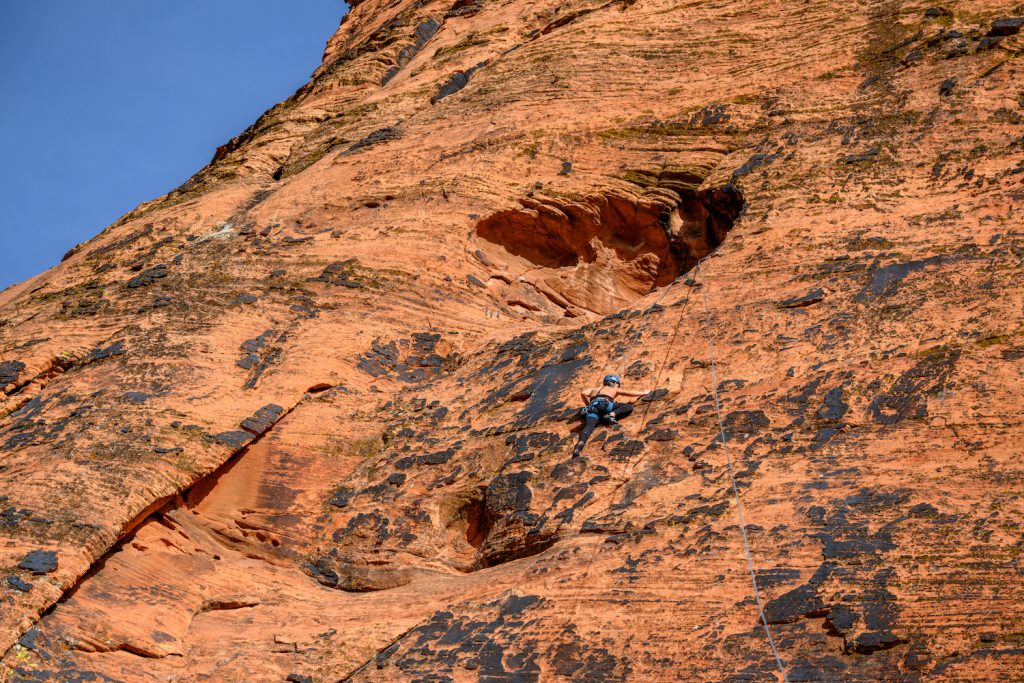
“Keep your handholds close to your shoulders, and look for footholds that are going to get you up. Sometimes we make the mistake of reaching too far ahead of ourselves,” says guide Todd Perkins of Southern Utah Guiding.
Perkins is contracted through Red Mountain Resort, which is only minutes away from the entrance of the park. It’s my home for two nights on this solo trip. The property’s location adds to its appeal—you can easily rent bikes to explore the area or book a guide for a day of scaling rocks.
Though locals may not know him by name, Perkins is a legend here. “I started climbing in 1989. When I first started […] there were only three areas that had established climbs,” he says. “My group of friends decided we needed to put up more routes, [so] we started establishing routes over the years. Put up hundreds, thousands.”
It’s thanks to him that the crag I’m on has routes and freshly re-bolted paths. My current route was Perkins’ first-ever climb, and now he’s watching me attempt to scale it as one of mine. As a new climber, getting outdoors has been a goal of mine over the course of the last two years. I’m afraid of heights, but lately I’ve felt called to face my fears.
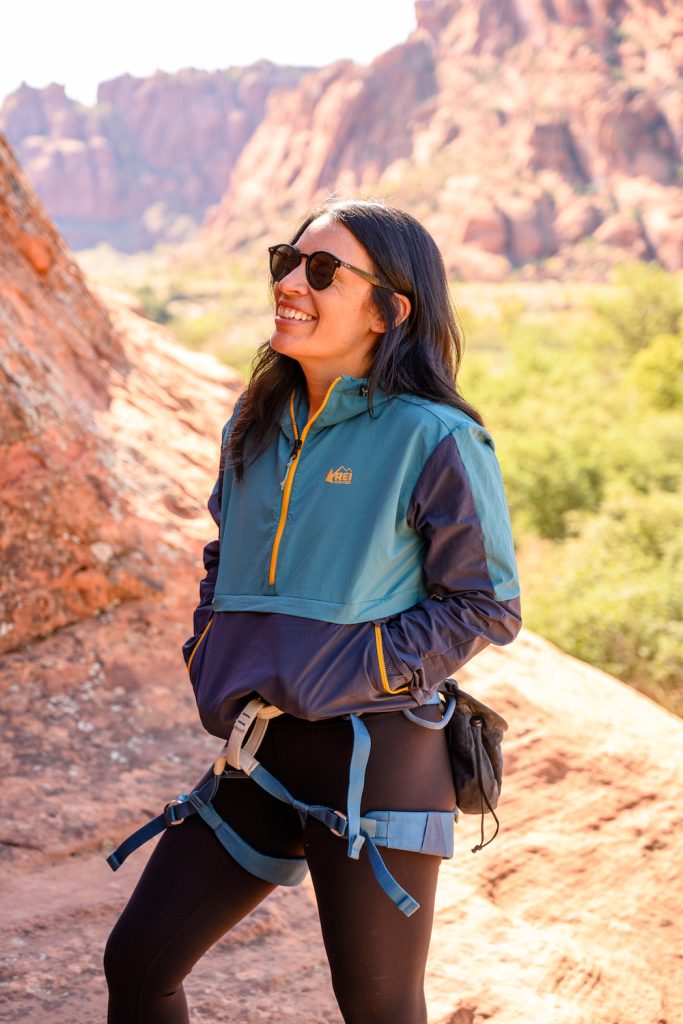
So I packed up and headed to the perfect place for a first ascent: Utah. The state is a rock climber’s playground, with five national parks, including Zion, Bryce Canyon, and Arches. It’s believed that the oldest rock formations are about 2.7 billion years old.
Some areas are also capped by black lava rock formed by volcanoes approximately 2.3 million to 20,000 years ago. Zion National Park’s rock layers were deposited between 110 and 270 million years ago and only recently eroded and uplifted to form the park you see today.
Driving through Zion is a spiritual experience—you pass beautiful red rock formations, including natural bridges, spires, pinnacles, and arches. But it’s St. George that is known for having some of the best sport-climbing routes in North America on varying rock types (volcanic, red sandstone, limestone).
To better get a sense of the region, I booked three outdoor experiences: canyoneering, climbing, and a via ferrata. During the half-day canyoneering excursion with Paragon Adventures, I wove through the canyon system, rappelled down small cliffs, and scrambled through narrows.
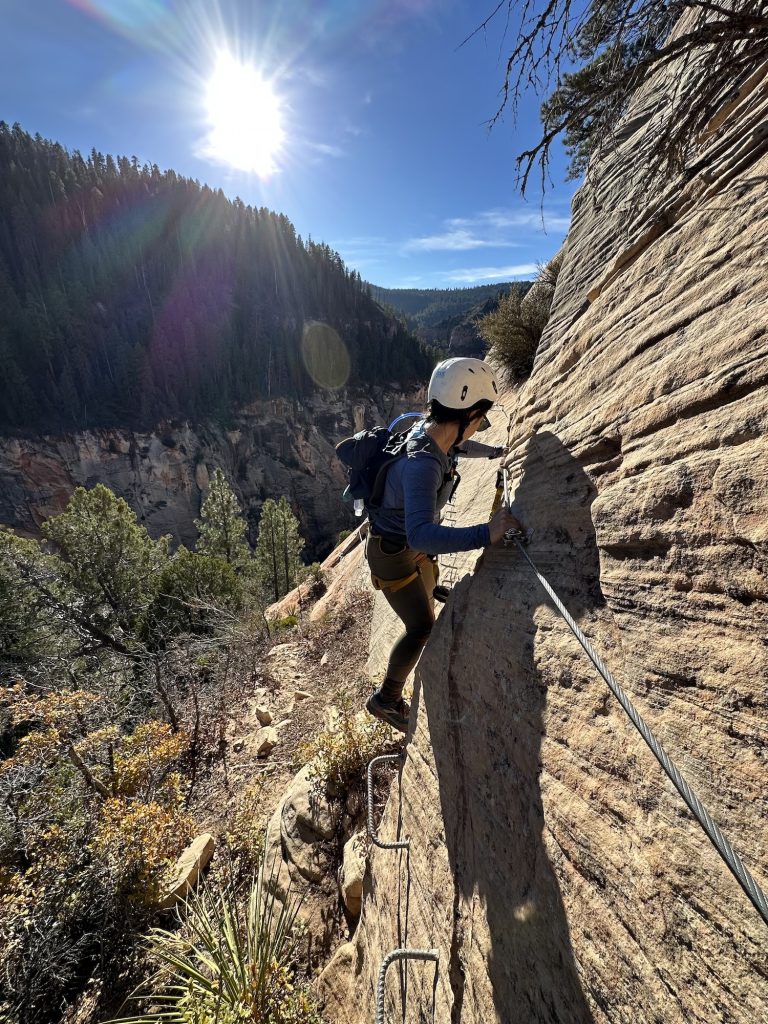
The via ferrata in Kolob Canyon is one of only a dozen in the U.S.
The tour is a good intro to getting your hands dirty, but it’s not too challenging or intimidating, unlike the via ferrata, a type of route that combines hiking and climbing and involves ladder rungs and a permanent safety cable that you’re continuously attached to. While they’re popular in Europe, there are only about a dozen via ferratas in the US, so naturally, Zion’s was also on my list.
The via ferrata tour takes you vertically across Kolob Canyon (sitting around 2,000 feet high), which, prior to 1967, was among the most difficult places to access. Today, visitors can scale its walls with Utah Adventure Center. The experience may be one of the coolest ways to see the park—second to these routes on Islands in the Sky.
Back here, on the wall, Perkins urges me to pause and study the rock. I pull back and run my hands across its surface, feeling for its grooves and edges. I familiarize myself with the scattered black patina guiding me north.
I slowly smear my feet to inch up the wall, a technique used on flat plains when there aren’t positive footholds. Each pull-up draws me closer to the summit. I finally pass the crux. Perkins’ silence means he’s letting me trust myself to finish the course.
At the top of the 150-foot route, I let out a shout and complete the climb. From up here, everything is clearer. My hands, my body, my strength, they got me here. I f*cking did it.
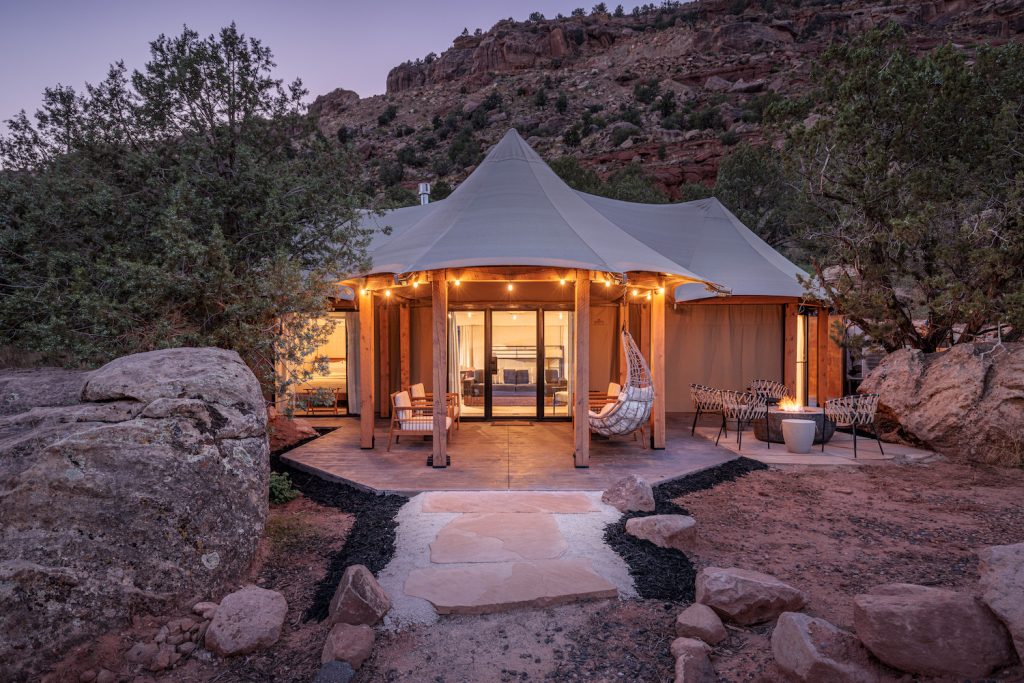
On my last night, while at dinner, I meet Leslie, a sassy retiree who moved to Greater Zion to avoid the snow in her home state. We order the New York strip. As I tell her about my adventures, a single young woman sits beside us. “It’s getting more common,” Leslie says, referring to solo travel among women visiting Utah.
We wonder out loud about the necessity of men—do we really need them? We’re only half joking. After dinner, Leslie heads off to drink whiskey at home, like a true lady. I retreat to my bed at Open Sky Zion.
The luxury campsite is tucked away on the cusp of Zion, with 13 tents serving as one- to two-bedroom suites. There’s only one restaurant onsite that’s open for dinner, so stock up on groceries (there’s a fridge, microwave, and grill in each tent) before arriving. The quiet at camp is refreshing—cell service is a little fickle, urging you to be in the moment.
By the time this story is published, I’ll have just turned 40 and will be entering a new season. My solo desert adventure was exactly what it needed to be—a farewell to the past and to him. After four decades of life, today feels like just the beginning. I’ve made it over the hill (and up a mountain), and damn if it doesn’t look good over here.
Rock Climbing Grade Levels
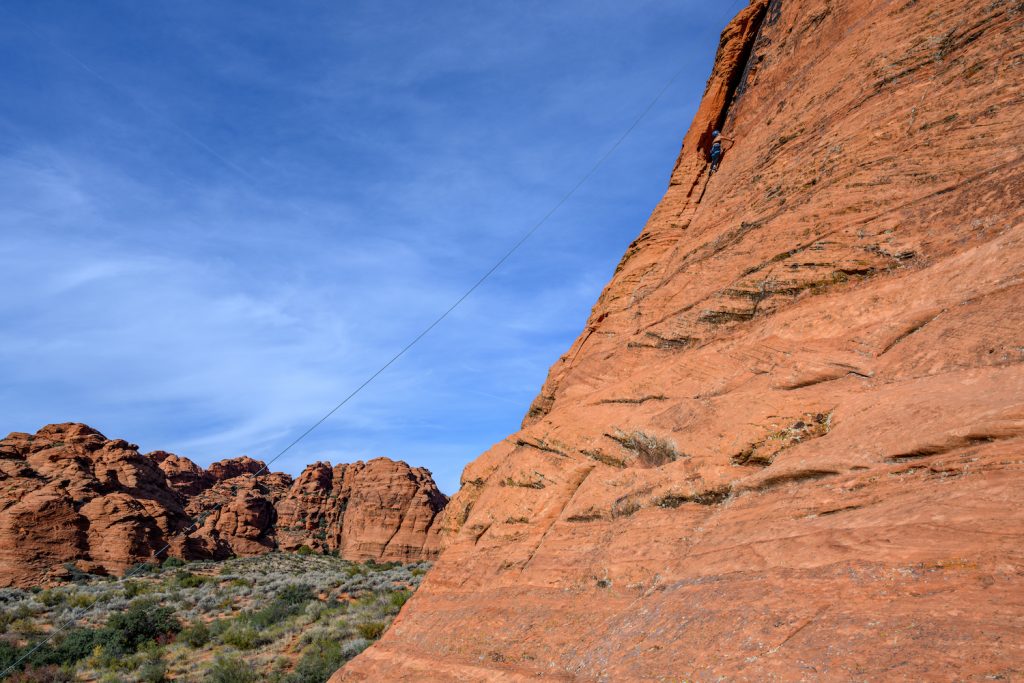
Climbing grades are subjective but can typically be categorized as the below (with letters a–d adding more specificity to numbered grades):
Beginner: 5.2–5.9
Intermediate: 5.10a–d to 5.11a–d
Advanced: 5.12a–d to 5.13a–d
Pro: 5.14a–d to 5.15a–d
Rock Climbing Terms
Crag: A rugged cliff or rock face
Crimp: A very thin edge that’s only large enough for the tips of your fingers
Crux: The most difficult section of a climbing route
Footholds: Small edges you can stand on with your toes or feet
Foot Smear: The act of using friction to gain vertical ground by pushing your climbing shoe directly against the rock
PARTNER CONTENT
Sport Climbing: A form of free climbing that involves a lead climber clipping into pre-drilled permanent bolts as they summit a rock
Top Rope: A form of climbing that allows a climber to scale a wall via an anchored rope at the top








